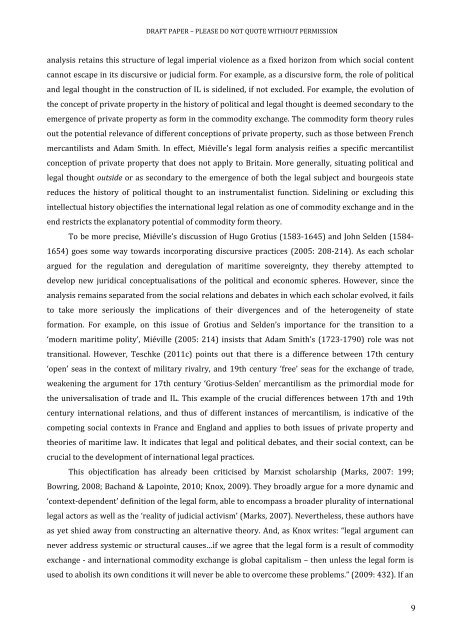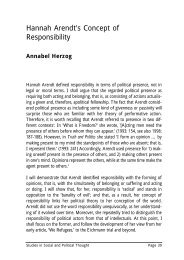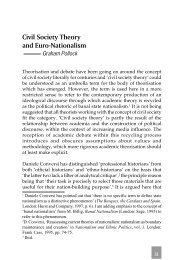Historical Materialism and International Law - University of Sussex
Historical Materialism and International Law - University of Sussex
Historical Materialism and International Law - University of Sussex
Create successful ePaper yourself
Turn your PDF publications into a flip-book with our unique Google optimized e-Paper software.
DRAFT PAPER – PLEASE DO NOT QUOTE WITHOUT PERMISSION<br />
analysis retains this structure <strong>of</strong> legal imperial violence as a fixed horizon from which social content<br />
cannot escape in its discursive or judicial form. For example, as a discursive form, the role <strong>of</strong> political<br />
<strong>and</strong> legal thought in the construction <strong>of</strong> IL is sidelined, if not excluded. For example, the evolution <strong>of</strong><br />
the concept <strong>of</strong> private property in the history <strong>of</strong> political <strong>and</strong> legal thought is deemed secondary to the<br />
emergence <strong>of</strong> private property as form in the commodity exchange. The commodity form theory rules<br />
out the potential relevance <strong>of</strong> different conceptions <strong>of</strong> private property, such as those between French<br />
mercantilists <strong>and</strong> Adam Smith. In effect, Miéville’s legal form analysis reifies a specific mercantilist<br />
conception <strong>of</strong> private property that does not apply to Britain. More generally, situating political <strong>and</strong><br />
legal thought outside or as secondary to the emergence <strong>of</strong> both the legal subject <strong>and</strong> bourgeois state<br />
reduces the history <strong>of</strong> political thought to an instrumentalist function. Sidelining or excluding this<br />
intellectual history objectifies the international legal relation as one <strong>of</strong> commodity exchange <strong>and</strong> in the<br />
end restricts the explanatory potential <strong>of</strong> commodity form theory.<br />
To be more precise, Miéville’s discussion <strong>of</strong> Hugo Grotius (1583-1645) <strong>and</strong> John Selden (1584-<br />
1654) goes some way towards incorporating discursive practices (2005: 208-214). As each scholar<br />
argued for the regulation <strong>and</strong> deregulation <strong>of</strong> maritime sovereignty, they thereby attempted to<br />
develop new juridical conceptualisations <strong>of</strong> the political <strong>and</strong> economic spheres. However, since the<br />
analysis remains separated from the social relations <strong>and</strong> debates in which each scholar evolved, it fails<br />
to take more seriously the implications <strong>of</strong> their divergences <strong>and</strong> <strong>of</strong> the heterogeneity <strong>of</strong> state<br />
formation. For example, on this issue <strong>of</strong> Grotius <strong>and</strong> Selden’s importance for the transition to a<br />
‘modern maritime polity’, Miéville (2005: 214) insists that Adam Smith’s (1723-1790) role was not<br />
transitional. However, Teschke (2011c) points out that there is a difference between 17th century<br />
‘open’ seas in the context <strong>of</strong> military rivalry, <strong>and</strong> 19th century ‘free’ seas for the exchange <strong>of</strong> trade,<br />
weakening the argument for 17th century ‘Grotius-Selden’ mercantilism as the primordial mode for<br />
the universalisation <strong>of</strong> trade <strong>and</strong> IL. This example <strong>of</strong> the crucial differences between 17th <strong>and</strong> 19th<br />
century international relations, <strong>and</strong> thus <strong>of</strong> different instances <strong>of</strong> mercantilism, is indicative <strong>of</strong> the<br />
competing social contexts in France <strong>and</strong> Engl<strong>and</strong> <strong>and</strong> applies to both issues <strong>of</strong> private property <strong>and</strong><br />
theories <strong>of</strong> maritime law. It indicates that legal <strong>and</strong> political debates, <strong>and</strong> their social context, can be<br />
crucial to the development <strong>of</strong> international legal practices.<br />
This objectification has already been criticised by Marxist scholarship (Marks, 2007: 199;<br />
Bowring, 2008; Bach<strong>and</strong> & Lapointe, 2010; Knox, 2009). They broadly argue for a more dynamic <strong>and</strong><br />
‘context-dependent’ definition <strong>of</strong> the legal form, able to encompass a broader plurality <strong>of</strong> international<br />
legal actors as well as the ‘reality <strong>of</strong> judicial activism’ (Marks, 2007). Nevertheless, these authors have<br />
as yet shied away from constructing an alternative theory. And, as Knox writes: “legal argument can<br />
never address systemic or structural causes…if we agree that the legal form is a result <strong>of</strong> commodity<br />
exchange - <strong>and</strong> international commodity exchange is global capitalism – then unless the legal form is<br />
used to abolish its own conditions it will never be able to overcome these problems.” (2009: 432). If an<br />
9
















